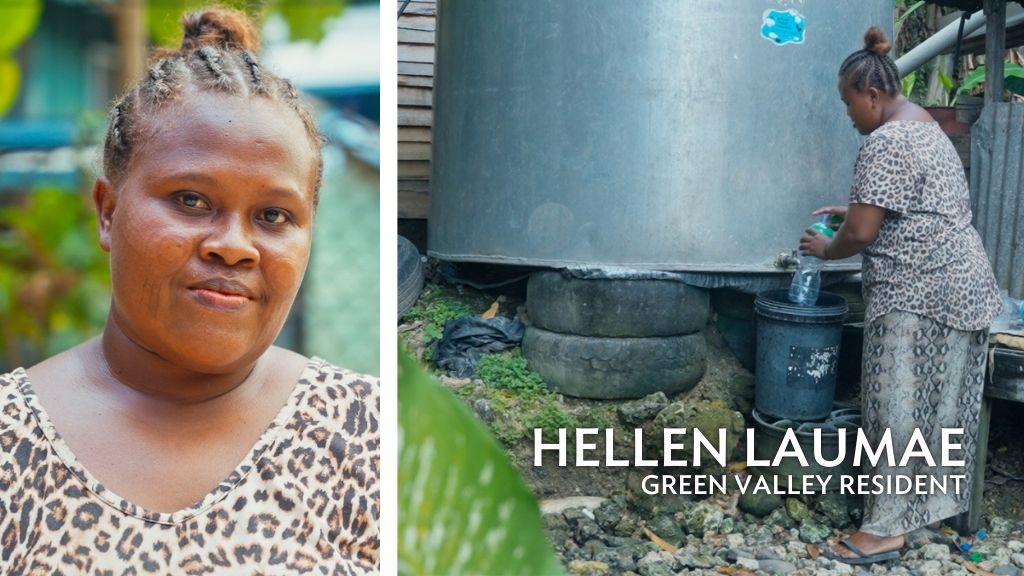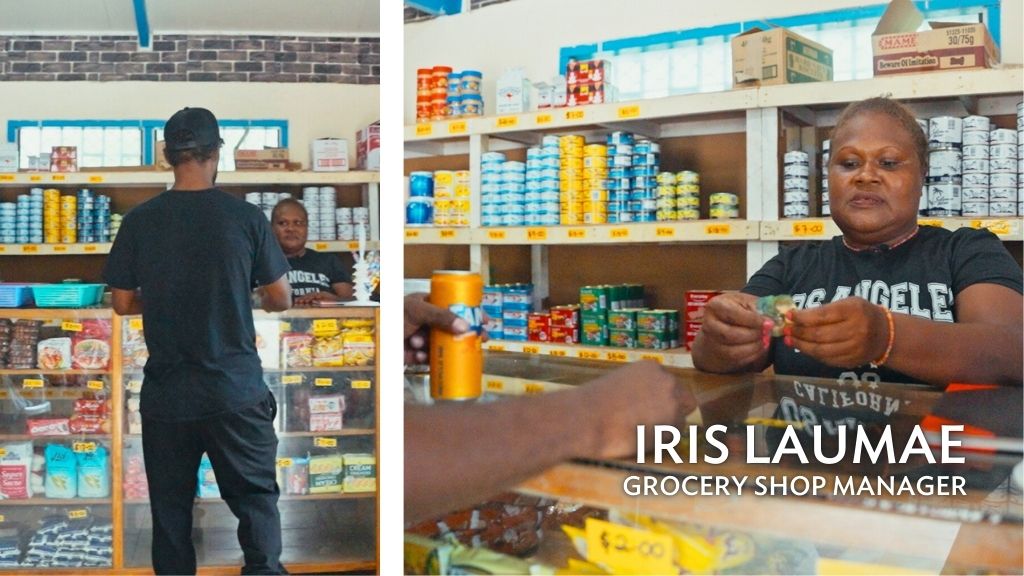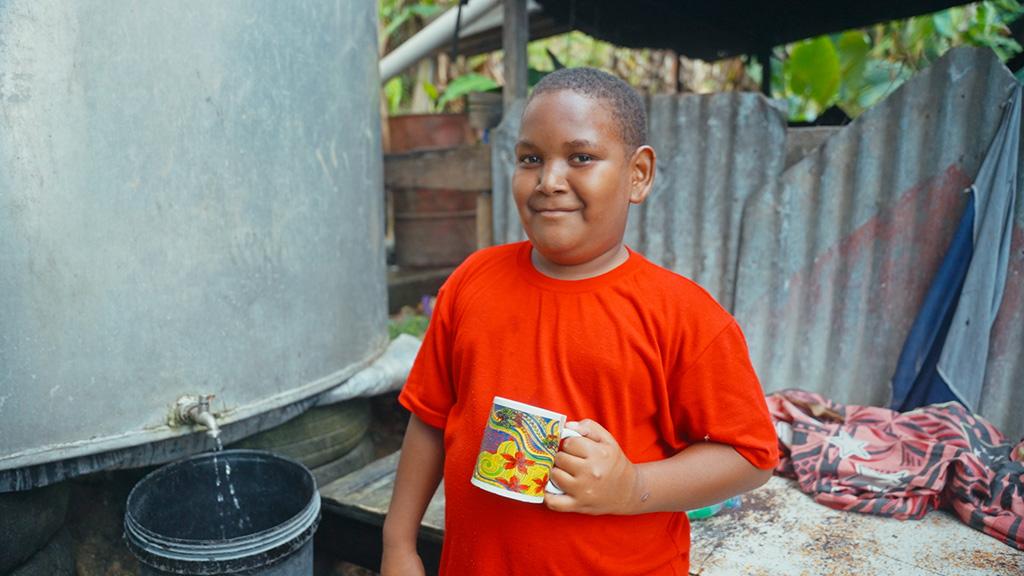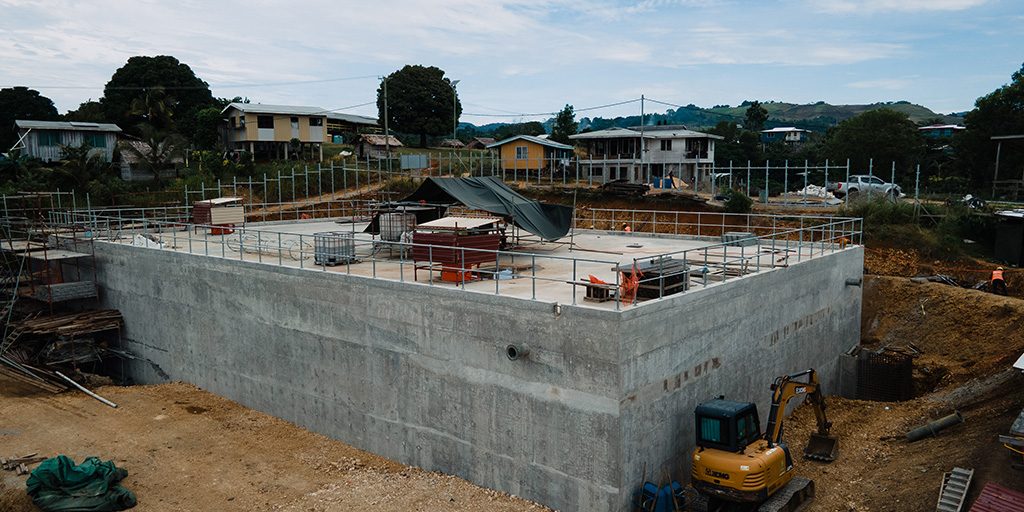For as long as she can remember, Hellen had no water at home. She walked for thirty minutes over hilly terrain to fetch water from the nearest stream for her family’s daily needs. When it rained, she collected and stored rainwater.
Hellen’s daily activities revolved around water availability. Many days she would trek twice to Mamulele Stream, East Honiara the nearest water source.
“We did not have time to do other chores. We spent most of our time just fetching water. We rested little and then in the evening we had to go fetch water again,” says Hellen.
Piped water remained out of reach, even though her settlement, Green Valley, lay within the boundaries of the Solomon Islands capital, Honiara.
All this changed in 2022, when the settlement was connected to Solomon Water, a public utility that provides water supply services and sanitation services to the greater Honiara area and provincial centers.
That milestone was achieved after close collaboration between the Asian Development Bank (ADB) and water utility Solomon Water to upgrade the country’s water supply.
Under the Urban Water Supply and Sanitation sector project, aging infrastructure is being modernized to cope with changing weather patterns and the country’s growing population.

ADB provided a $34 million grant from the Asian Development Fund, and a $28 million loan alongside other development partners including the European Union, Global Environment Facility, and the World Bank.
“There is an increasing demand to provide safe drinking water services to our customers. The population growth here is high and our aim is to provide safe drinking water to a broader range of customers throughout Solomon Islands,” says Solomon Water Chief Executive Officer Carmine Piantedosi.
“Currently, people who don’t have access to safe drinking water either access their water from harvesting rain through rain tanks or from streams or individual boreholes. In most cases, the water is not treated so it’s not safe to drink or to use.”
Having water on tap means Hellen has more say in how she spends her time, including helping out her neighbors. “Now we have water, we can do other things like gardening, house chores and also when the community needs help, we have time to help.”
Community leader, Stephen Melea, says that the quality of life in the community has increased with access to the water supply system.
“Every morning, before they went to school, we told children that after school they must remember to fetch water from Mamulele Stream.
“This disturbed their learning because, at school, they are burdened by the thought that after school they must go and fetch water. If they did not fetch water, then we were not able to have water for drinking, cooking, washing, and bathing,” says Stephen.
The water supply system has removed from women and children the burden of fetching water. It has also improved hygiene and sanitation, with many homes installing flush toilets.
“When we were connected to Solomon Water, our children became more relaxed and are enjoying their school life. And I have also seen that their learning has improved,” says Stephen.
Connection to the water supply is also good news for local businesses.

Iris Laumae manages a grocery shop in Green Valley. She can open the business earlier to serve customers, as she no longer has to spend the early morning hours collecting water.
“When I didn’t have water here, I used to go to Mamulele Stream to fetch water and I opened the shop at 9 a.m. Now that I have water, I open my shop at 6 a.m. and my customers can come early to buy what they need.”
Since 2019, the Urban Water Supply and Sanitation sector project has enabled Solomon Water to connect 8,000 families and businesses to the water supply.

The project has five key objectives—improving water supply and access; improving sanitation services by constructing new sewer systems and treatment plant; promoting hygiene awareness and educating on water conservation and delivery services; strengthening the operational and managerial capacity at Solomon Water to deliver efficient services; and enhancing water catchment and resource management.
Under the project, aging infrastructure is being modernized to cope with changing weather patterns and the country’s growing population.
“The project will increase household access to safe water and improved sanitation and raise the quality of life and wellbeing of urban and peri-urban communities in Solomon Islands,” said the Senior Director of ADB’s Water and Urban Development Unit Norio Saito.
As works progress, more families and businesses will be connected to a safe, reliable, and sustainable water supply that brings health, better hygiene, and prosperity to the people of Solomon Islands.
– Asian Development Bank









